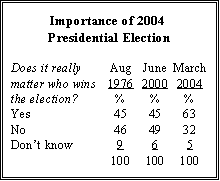Summary of Findings

The long general election campaign begins with voters paying much more attention than usual and a decidedly greater number of Americans thinking that it matters who wins in the fall than felt that way four years ago. However, roughly half of Americans already say the campaign is too long, “boring” and “too negative.”
More than six-in-ten Americans (63%) think it really matters more who wins the 2004 presidential election this year, compared with 45% who expressed that view in June 2000. The increase is most notable among Democrats (68%, up from 46% in 2000), but growing numbers of Republicans and independents also believe it really matters who wins in the fall (Republicans up 16%, independents 15%).
Despite the public’s sense of the stakes in this year’s election, many Americans already perceive that the candidates have gone too negative. Fully 48% think that Kerry has been too personally critical of President Bush, while 33% say Bush has been too personally critical of Kerry. The latest Pew Research Center national poll of 1,703 Americans, conducted March 17-21, finds that nearly half of the public (47%) believes that, in general, the campaign is too negative. Republicans are somewhat more critical of the early tone of the campaign than are Democrats 50% of Republicans say it has been too negative compared with 43% of Democrats.

A separate Pew survey of 1,065 Americans, conducted March 22-24, shows that criticisms lodged by former White House counter-terrorism aide Richard Clarke are drawing significant public interest. About four-in-ten Americans (42%) say they have heard “a lot” about Clarke’s claim that the president ignored serious warnings prior to the Sept. 11 attacks and 47% say they have heard “a little” about his claims. Just 10% say they have heard nothing at all about Clarke’s criticisms. The story is attracting comparable levels of interest among Republicans and Democrats.
Perhaps reflecting the early campaign skirmishing, ideological perceptions of the candidates have begun to shift. The survey finds an increasing number of voters placing Kerry at the liberal end of the ideological spectrum. Republicans, in particular, view Kerry as far more liberal today than they did just two months ago, prior to the start of the Democratic primaries.
With seven months to go until Election Day, most voters report they have already seen ads for the Bush and Kerry campaigns, and this is especially the case for those in the swing states. Overall, 65% of voters say they have seen one or more of Bush’s campaign commercials, but that figure rises to 76% of those in swing states. Similarly, 61% of all voters and 69% of those in swing states say they have seen a TV commercial for Kerry. People in those highly-contested states do not have markedly different impressions of the campaign from those living in Republican and Democratic
(Note: States are categorized based on presidential vote in the 1992, 1996 and 2000 elections. Democratic states are those that favored Clinton and Gore by margins significantly higher than the national average. Republican states, likewise, favored the Republican candidates more than the average. Finally, swing states are those that have divided between the candidates or have been won by margins very close to the national average in each year.)

Aside from viewing this year’s election as important, the public also is far more focused on the campaign than in past elections. Nearly two-thirds of voters (65%) say they have thought “quite a lot” about the presidential campaign. That level approaches peak engagement in the 2000 campaign, reached in early November 2000, when 72% said they had thought quite a lot about the campaign. In the spring of 2000, just 48% said they were giving a lot of thought to the campaign. This also is translating into higher interest in campaign news currently, 35% say they are following news about the presidential campaign very closely, up from 24% last month.
Overall, a narrow majority of the public (51%) has a favorable impression of the campaign so far. Democrats and Republicans generally express positive opinions of the campaign so far (56% of Democrats, 54% of Republicans), while the views of independents are more mixed: 45% have a favorable opinion of the campaign, 43% have an unfavorable opinion.
By more than five-to-one (81%-17%), the public sees this year’s election as important rather than unimportant, and this opinion is held by similar numbers of Democrats, Republicans and independents. There also is partisan agreement on the campaign’s length: about half of Republicans, Democrats and independents feel the campaign is too long. Older Americans, in particular, are of the opinion that the presidential campaign is excessively long. By more than two-to-one (64%-28%), people age 65 and older believe the campaign is too long.
The new survey, conducted during the commemoration of the first anniversary of the start of the Iraq war and after the terrorist attacks in Madrid, finds that 55% feel the war was the right decision. Just half of Americans believe the war in Iraq helped the war on terrorism, the lowest percentage to express that view since the war began.
The Madrid attacks have drawn considerable public interest, particularly compared with other foreign news stories. Roughly a third of Americans (34%) followed news of the attacks very closely. There also has been a modest increase in public worries about terrorism 20% say they are very worried about a terrorist attack in the U.S., up from 13% last month.
By contrast, the deployment of a small number of U.S. military forces to Haiti has drawn very little attention from the public. Just 15% say they have been following news of civil unrest in Haiti very closely, and an overwhelming majority of Americans say they have heard a little (60%) or nothing at all (22%) about the deployment of U.S. forces there. The public has a divided opinion of the mission 45% are opposed, 43% in favor.

